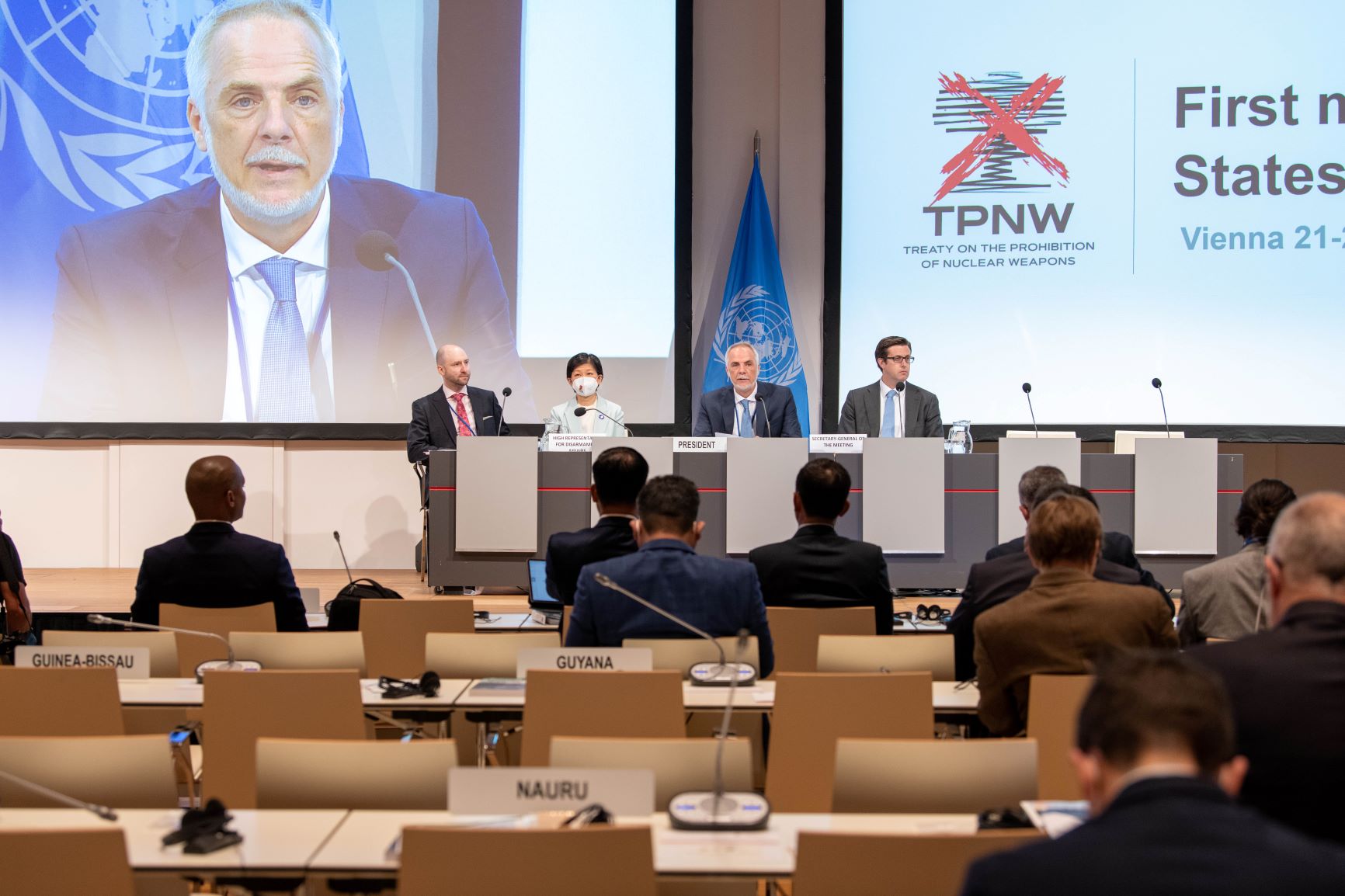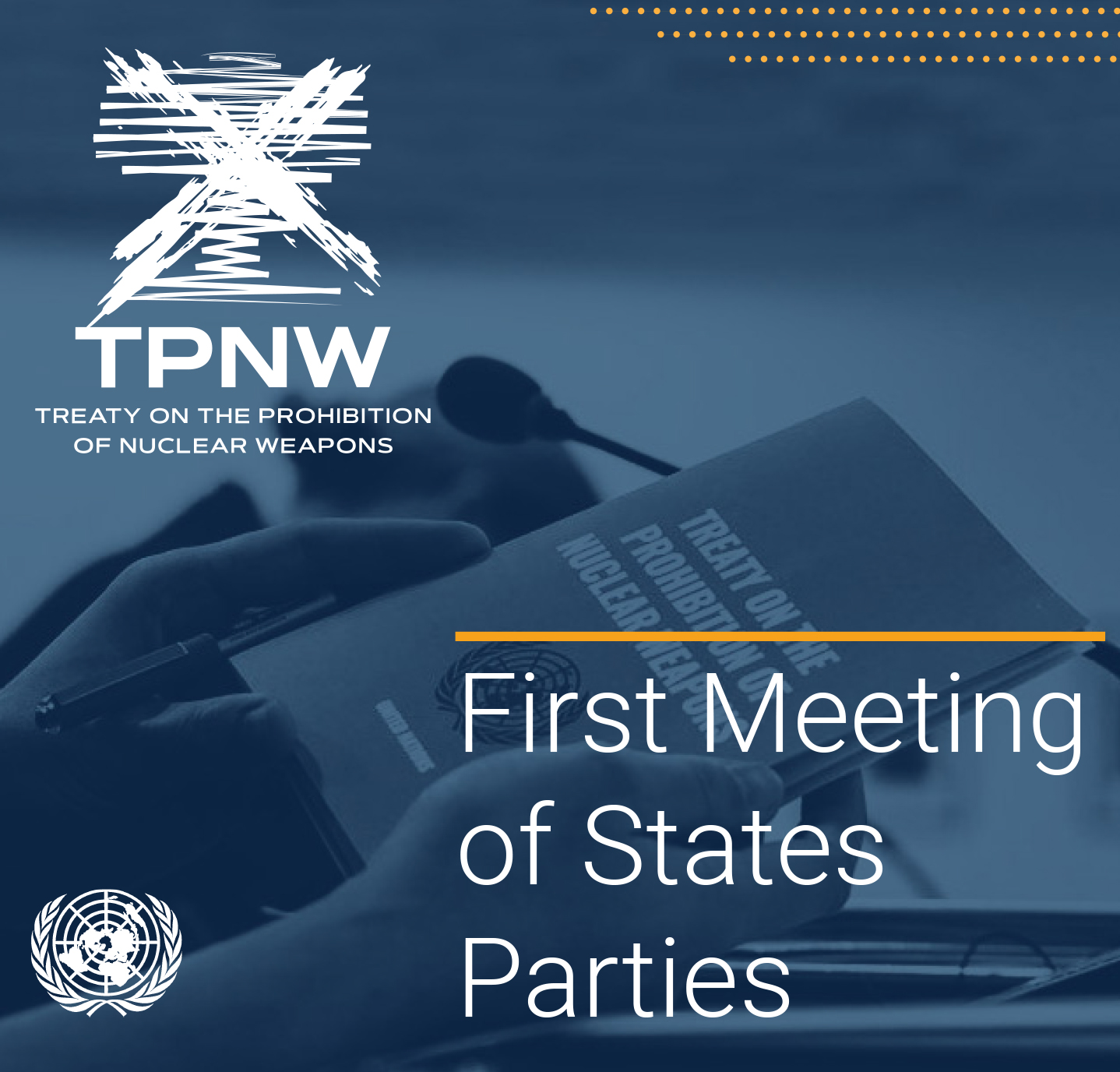
UNIS/SGSM/1246
28 June 2022
The Secretary-General congratulates States Parties to the Treaty on the Prohibition of Nuclear Weapons (TPNW) on the successful conclusion of their First Meeting.
The Secretary-General welcomes the adoption of the political declaration and action plan, which will help set the course for the Treaty's implementation and are important steps toward our shared goal of a world free of nuclear weapons.
On the margins of the First Meeting of States Parties to the Treaty on the Prohibition of Nuclear Weapons (TPNW), the United Nations Under-Secretary-General and High Representative for Disarmament Affairs Izumi Nakamitsu will speak to members of the media about her expectations for the meeting and the role of the United Nations.
The TPNW, the first multilateral nuclear disarmament treaty to be negotiated in more than two decades, was adopted on 7 July 2017 at the United Nations and entered into force on 22 January 2021. To date, 65 States have ratified or acceded to the TPNW and 86 have signed it.
UNIS/SGSM/1244
21 June 2022
Nuclear weapons are a global scourge.
A deadly reminder of countries' inability to solve problems through dialogue and collaboration.
These weapons offer false promises of security and deterrence — while guaranteeing only destruction, death, and endless brinksmanship.
Today, the terrifying lessons of Hiroshima and Nagasaki are fading from memory.
The once unthinkable prospect of nuclear conflict is now back within the realm of possibility.
More than 13,000 nuclear weapons are being held in arsenals across the globe.
In a world rife with geopolitical tensions and mistrust, this is a recipe for annihilation.
UNIS/MA/308
17 June 2022
The First Meeting of States Parties to the Treaty on the Prohibition of Nuclear Weapons (TPNW) will be held at the Austria Center Vienna in Vienna from 21 – 23 June 2022.
The TPNW includes a comprehensive set of prohibitions related to nuclear weapons. These include undertakings not to develop, test, produce, acquire, possess, stockpile, use or threaten to use nuclear weapons.
On the opening day, Tuesday 21 June, President-designate Ambassador Alexander Kmentt (Austria) will speak to members of the media about the Treaty’s key objectives and his expectations for the First Meeting of States Parties to examine the Treaty’s implementation and measure progress towards its goals.
The First Meeting of States Parties to the Treaty on the Prohibition of Nuclear Weapons (TPNW) will be held at the Austria Center Vienna in Vienna from 21 – 23 June 2022. The President- designate of the meeting is Ambassador Alexander Kmentt (Austria).
The TPNW, the first multilateral nuclear disarmament treaty to be negotiated in more than two decades, was adopted on 7 July 2017 at the United Nations and entered into force on 22 January 2021. United Nations Secretary-General António Guterres has called the Treaty “an important step towards the goal of a world free of nuclear weapons and a strong demonstration of support for multilateral approaches to nuclear disarmament.”
Article 8, paragraph 2, of the Treaty specifies that "the first meeting of States Parties shall be convened by the Secretary- General of the United Nations within one year of the entry into force of this Treaty." The meeting was originally planned for early 2022 but States Parties were subsequently forced to postpone it to later in the year due to the COVID-19 pandemic.
UNIS/MA/305
30 May 2022
The First Meeting of States Parties to the Treaty on the Prohibition of Nuclear Weapons (TPNW) will be held at the Austria Centre Vienna in Vienna from 21 – 23 June 2022. The President-designate of the meeting is Ambassador Alexander Kmentt (Austria).
The TPNW entered into force on 22 January 2021 - the first multilateral nuclear disarmament treaty in more than two decades. UN Secretary-General António Guterres has called the Treaty “an important step towards the goal of a world free of nuclear weapons and a strong demonstration of support for multilateral approaches to nuclear disarmament.”
The TPNW contains, inter alia, a comprehensive set of prohibitions on participating in any nuclear weapon-related activities. This includes undertakings not to develop, test, produce, acquire, possess, stockpile, use or threaten to use nuclear weapons. The Treaty also prohibits the deployment of nuclear weapons on national territory as well as the provision of assistance to any State in the conduct of prohibited activities. The TPNW requires States parties to assist individuals under their jurisdiction affected by the use or testing of nuclear weapons, as well as to take environmental remediation measures in areas under their jurisdiction or control that have been contaminated due to the testing or use of nuclear weapons.





























































